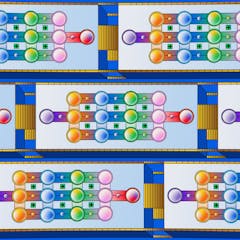
Articles on Machine learning
Displaying 1 - 20 of 283 articles

A recent study of the car loans sector showed that a machine learning algorithm could make decisions that were 34% more profitable than salespeople in dealerships.

Food fraud costs billions globally. But blockchain and machine learning offer hope for a more transparent and safer food system.

As New Zealand readies itself for AI-assisted medical treatment targeted to individuals, officials need to ensure the benefits outweigh the risks.

A new AI system may improve soccer tactics in 90% of corner kicks – but is it ready for the big leagues?

However exciting the technological developments may be, the task of reading and analyzing the Greek and Latin texts recovered from the papyri will fall to human beings.

The toll on wildlife from illegal fishing, bycatch and entanglement in fishing gear is likely underestimated, because it doesn’t account for ‘dark’ fishing vessels, a new study finds.

Enthusiasm for the capabilities of artificial intelligence – and claims for the approach of humanlike prowess –has followed a boom-and-bust cycle since the middle of the 20th century.

Existing AI systems learn patterns from very large piles of data – but they have no insight.

Artificial intelligence has been around for decades, and is much more than just ChatGPT. Here’s a rundown of some lesser known AI applications.

Traditionally dominated by the use of centralised, resource-intensive servers, machine learning is being democratised with the growth of “TinyML”, distinguished by its small size and low cost.

Artificial intelligence is everywhere, and the tech industry is racing along to develop ever more powerful AIs. Three scholars look ahead to the next chapter in this technological revolution.

Research suggests AI could diagnose depression from health records or even social media posts. And it could overcome GP bias when it comes to prescribing medications.

AI systems will accelerate the pace of war.

It’s the fourth most popular website in the world, but our new study shows toxic commentary can still thrive on Wikipedia. There’s a lot at stake if too many editors are driven away.

The explosion of generative AI tools like ChatGPT and fears about where the technology might be headed distract from the many ways AI affects people every day – for better and worse.

Students often use generative AI tools for engaged learning. They have a critical and nuanced understanding of these tools.

This new last Beatles song, enabled in part by AI, demonstrates the importance of the profound and lasting connections between the four musicians.

A tangle of silver nanowires may pave the way to low-energy real-time machine learning.

The Turing test, first proposed in 1950 by Alan Turing, was framed as a test that could supposedly tell us whether an AI system could ‘think’ like a human.

An AI model shows that building collapses in Lagos are location specific, and soil testing can help to check them.
